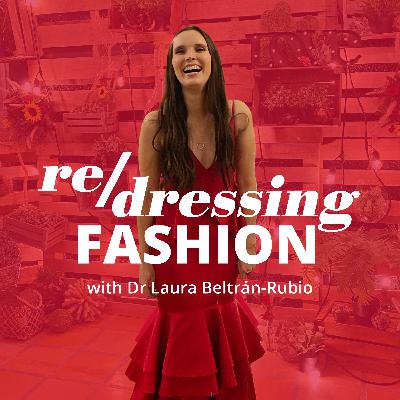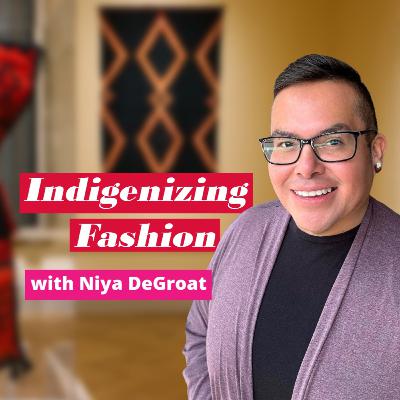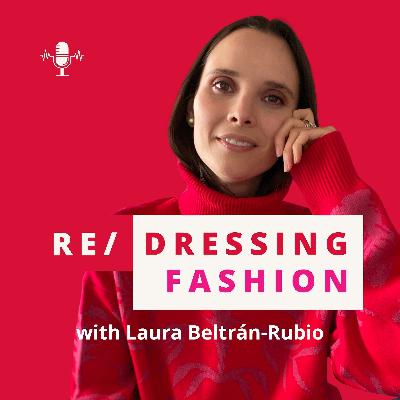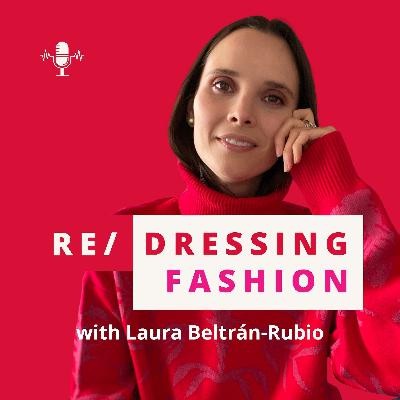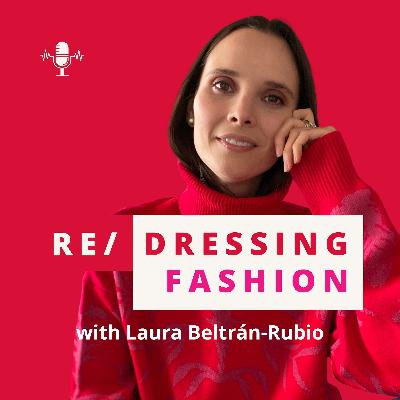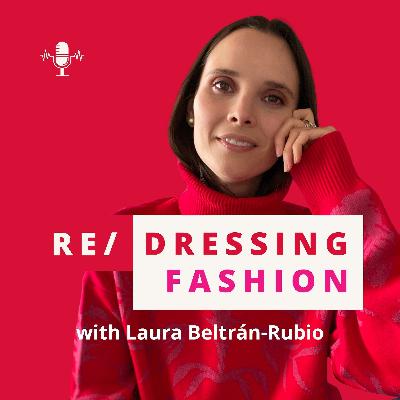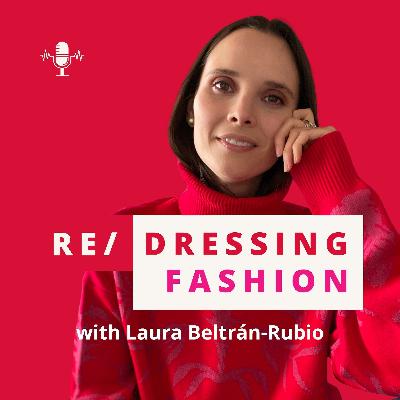Discover Redressing Fashion
Redressing Fashion

Redressing Fashion
Author: Laura Beltrán-Rubio
Subscribed: 4Played: 22Subscribe
Share
© Laura Beltrán-Rubio
Description
Have you ever imagined fashion being as diverse as human culture? Have you ever dreamed of a respectful, ethical, and socially just fashion industry? Have you ever envisioned sustainability being at the core of the entire fashion system?Join fashion curator, researcher and educator, Laura Beltran-Rubio, in the quest to translate scholarly insights into actionable strategies to reshape how we create, wear, and think about fashion.
31 Episodes
Reverse
Join me in celebrating the tenth episode of Redressing Fashion! It has been a long journey, filled with constant changes—including the major transition I’m currently navigating. So today I take more of a reflective stance to share personal milestones, my recent career shifts, and a bunch of not-so-loose thoughts about the importance of fashion history in shaping the future of the industry. I talk, in particular, about the need for deeper engagement with historical narratives to avoid cultural appropriation and promote inclusivity at the broad industry and public policy level. At a more personal level, I share insights on how personal experiences with fashion can inform identity and resistance, guiding our path when embracing our values through style choices.-----------------RELEVANT LINKSStyle coaching program: https://laurabelru.com/style/ Advent Calendar post on the pollera: https://www.instagram.com/p/DSFbGrgjBuE/& same video on TikTok: https://www.tiktok.com/@laurabelru/video/7582247361427115294 Find me on:https://www.instagram.com/laurabelru https://www.tiktok.com/@laurabelru https://www.youtube.com/@laurabelru -----------------CHAPTERS00:00 Welcome back!01:36 Let's start with a mini celebration!06:08 Our agenda for this episode08:51 How I got here09:55 What a researcher can bring to fashion16:14 Returning to dreams long lost (and tearing up!)17:23 Why I left academia20:31 What does fashion history have to offer for the industry?21:13 On academic judgement (and more tears!)26:26 Fashion history in the real world32:42 Research-turned-fashion35:59 On wearing my own research36:38 Styling and fashion history38:40 Fashion history applications at a personal level41:38 Three little things
In this solo episode, I discuss the importance of mindful shopping, especially during the holiday season. I emphasize the freedom of choice in shopping and the impact that each of our shopping habits can have on the world around us—immediately and more broadly. I talk about the reasons for wanting to shop (or not), the significance of budgeting and planning ahead, and share a few practical strategies for shopping more mindfully. I also talk about gifting, touching on some history, the emotional aspects of gift giving, and propose the idea of reclaiming gift-giving as a sacred practice.The episode is meant to be a tool for listeners to reflect on their shopping habits and consider the broader implications of their purchases. And, if you ask me, it’s full of gems!RELEVANT LINKSAdventures in de-styling: https://destyling.substack.com/ Blog - Unshopping on Black Friday: https://destyling.substack.com/p/issue-2-unshopping-on-black-friday Blog from 2023 on Holiday Shopping: https://laurabelru.com/fashion-practices-on-holiday-shopping/ Style coaching program: https://laurabelru.com/style/ Find me on:https://www.instagram.com/laurabelru https://www.tiktok.com/@laurabelru https://www.youtube.com/@laurabelru -----------------TAKEAWAYSGifting is important and should be meaningful.Mindful giving can reduce waste.Many gifts end up in the trash shortly after purchase.Encouraging thoughtful gifts can lead to better choices.Consumerism often leads to meaningless gifts.Mindful gifting reflects personal values.Sustainable giving is a growing trend.Gifts should resonate with the recipient.Awareness of waste can change gifting habits.Mindful gifting can foster deeper connections.
In this episode, Laura talks with Dr Georgia Ennis about plastic-free living, sustainable fashion, and the close connection between plastic-free fashion and language ecologies in the Ecuadorian Amazon. They share insights on how to conduct research as allies of Indigenous peoples worldwide, embrace slower approaches to fashion, and bring scholarly research outside of academia. Tune in to learn about culture reclamation among speakers of Amazonian Kichwa and practice-based strategies on how to realistically live with less plastic in a plastic world!Relevant linksAMUPAKIN’s website: https://amupakinachimamas.com/AMUPAKIN’s instagram: https://www.instagram.com/amupakin/AMUPAKIN’s TikTok: https://www.tiktok.com/@amupakin.achimamas--Georgia’s website: https://www.georgiaennis.com/ Georgia’s instagram: https://www.instagram.com/plasticfreephd/Georgia-s book: Rainforest Radio: Language Reclamation and Community Media in the Ecuadorian Amazon (Tucson: The University of Arizona Press, 2025)--References & further readingsChef Sean Sherman (The Sioux Chef): https://seansherman.com/ Susan Strasser, Waste and want: A social history of trash (New York: Henry Holt and Co., 2000)Kyle Whyte, “Settler Colonialism, Ecology, and Environmental Injustice,” Environment and Society 9, no. 1 (2018): 125–44.See also Kyle Whyte’s website: https://seas.umich.edu/research/faculty/kyle-whyte Michel-Rolph Trouillot, Global Transformations: Anthropology and the Modern World (New York: Palgrave Macmillan, 2003)
This episode is a recording after my Keynote Lecture for the Costumers of Color 2025 Georgian Global Salon. The lecture sheds light on some underrepresented histories of fashion in the eighteenth century. The talk explores how the diversity of fashion practices among Black, Indigenous, and People of Color around the world shaped fashion in the Georgian era. In an increasingly globalized century, fashion became both a form of resistance and an expression of changing, often hybrid, and increasingly complex human and cultural identities.My most special thanks to Gigi Coulson of Costumers of Color for allowing me to share this lecture and everyone who attended the event for their thoughtful feedback, support and enthusiasm!Learn more about the Costumers of Color Global Salon at: https://costumersofcolor.org/2025-annual-event/.------------------------------Chapters00:00 Introduction01:30 The Other Georgian Fashion09:33 Context: The Georgian Period14:44 Georgian Fashion: An Overview20:46 Imperial Fashions in the Georgian Era31:09 Fashions from the Periphery46:21 Closing Remarks------------------------------Relevant links & referencesWaitlist for upcoming fashion history trips: https://laurabelru.com/travel/Costumers of Color: https://costumersofcolor.org/Image references, including links and credits: https://laurabelru.com/the-other-story-of-georgian-fashion-costumers-of-color-global-salon-keynote-lecture/------------------------------More about LauraVisit my website: https://laurabelru.com/Find me on Instagram: https://www.instagram.com/laurabelruFind me on TikTok: https://www.tiktok.com/@laurabelruSign up to my newsletter: https://laurabelru.substack.com/
Niya DeGroat shares their journey in the fashion industry, highlighting the importance of Indigenous representation and the challenges faced by Two-Spirit individuals. Niya discusses their work with Phoenix Fashion Week, the recent launch of their magazine Indigène, and the significance of slow fashion practices. Niya emphasizes the need for collaboration between Indigenous designers and mainstream fashion, advocating for a more inclusive and equitable industry. The conversation also touches on the storytelling aspect of Indigenous fashion and the impact of colonialism on identity.TakeawaysNiya DeGroat emphasizes the importance of Indigenous representation in fashion.The journey of Niya from intern to a prominent figure in Indigenous fashion.Indigenous fashion is rooted in storytelling and cultural significance.The need for collaboration between Indigenous designers and mainstream fashion.Slow fashion practices are essential for sustainability and cultural preservation.Niya’s experience highlights the challenges of navigating identity in a Western-centric fashion industry.The significance of Two-Spirit identity in contemporary fashion.Indigène Magazine aims to showcase diverse Indigenous voices and stories.The impact of colonialism on Indigenous fashion and identity.Niya advocates for a more inclusive and equitable fashion industry.Links, references & further readingIndigène Magazine: https://indigenemagazine.com/Niya’s website: https://www.niyadegroat.com/Indigène on Instagram: https://www.instagram.com/indigenemagazine/Niya on Instagram: https://www.instagram.com/niyadegroat/One of Laura’s favorite articles by Niya, which she frequently assigns in class or recommends to students: https://www.culturalsurvival.org/publications/cultural-survival-quarterly/decolonizing-fashion-one-runway-time
In this episode, Dr Laura Beltrán-Rubio reviews the exhibition ‘Textiles: The Art of Mankind’ at the Fashion and Textile Museum in London. She discusses the integral role of textiles in human history, the beauty of the exhibited pieces, and the challenges faced in curatorial practices. Laura critiques the language and representation used in the exhibition, highlighting missed opportunities to engage with broader themes and community narratives. She concludes with suggestions for improving future exhibitions, emphasizing the importance of community engagement and thoughtful representation.TakeawaysTextiles are essential to human creativity and history.The exhibition showcased a deep connection between textiles and humanity.Curatorial practices can sometimes perpetuate outdated narratives.Language and naming conventions are crucial in representation.Missed opportunities exist in engaging with community narratives.Textiles reflect complex histories and identities.The beauty of textiles can evoke personal connections.Community engagement enhances the understanding of textile art.Critique of the exhibition's language and terminology is necessary.Future exhibitions should prioritize inclusivity and representation.Relevant links & referencesOn molas: ‘Fashioning Identity: Mola Textiles of Panamá’ by Andrea Vazquez de Arthur (8 October 2020)On the ‘art’ vs ‘craft’ debate around textiles: Sew What? ‘Episode 21 – The Art of Craft: Needlework in the Art and Craft Debate’ (1 October 2020)Book: ‘Textiles: The Art of Mankind’ (commissionable link)Exhibition website: https://fashiontextilemuseum.org/exhibitionsdisplays/textiles-the-art-of-mankind/ More about LauraWebsite: https://laurabelru.com/Instagram: https://www.instagram.com/laurabelruTikTok: https://www.tiktok.com/@laurabelruNewsletter: https://laurabelru.substack.com/
In celebration of the back-to-school season, Dr. Laura Beltrán-Rubio discusses the need to redress fashion history education by incorporating diverse perspectives and personal narratives, while also emphasizing the significance of engaging students’ passions and values in their learning process. The conversation highlights various strategies for educators to create a more inclusive and meaningful fashion curriculum.This is not a fashion history podcast nor a practical note on fashion and style, but it has bits and pieces of both. While this is intended for mostly fashion educators and students, I also hope it will be relevant to those who are not fashion students or educators or are not returning to fashion school this year.Special thanks to Katie Ibsen, Serena Dyer, Jonathan Square, and Kimberly Jenkins for their generous contributions to this episode!Chapters00:00 Reflecting on Fashion Education04:58 Dismantling the Fashion History Survey09:33 Making History Personal12:02 Redressing Fashion History15:47 Engaging and Personal Histories22:30 Antidotes to AI26:00 Outside the History Classroom27:55 Personal Style and Fashion Scholarship32:12 Third Spaces for Fashion in Schools35:20 Three Little ThingsTakeaways- Critical thinking should precede reliance on AI tools.- Fashion education needs to reflect diverse cultural narratives.- Personal style development is a continuous journey.- Engaging students' passions is crucial for effective learning.- Redressing fashion history involves questioning traditional narratives.- Diversity in fashion education enhances student engagement.- Fashion history should include non-Western perspectives.- Teaching strategies should adapt to student backgrounds.- Fashion education can foster personal and social values.Meet the scholars (in order of mention/appearance)Professor Hazel Clark: https://www.newschool.edu/parsons/faculty/hazel-clark/Katie Ibsen: https://www.katieibsen.com/Dr Serena Dyer: https://www.serenadyer.co.uk/Dr Jonathan Square: https://www.jonathansquare.com/Kimberly Jenkins: https://www.kimberlymjenkins.com/Relevant links & referencesFashion Education: The Systemic Revolution: https://www.intellectbooks.com/fashion-education Learn about the history of boteh: https://fashionandrace.org/database/boteh/Join my group style coaching program: https://laurabelru.com/style/ More about LauraVisit my website: https://laurabelru.com/Find me on Instagram: https://www.instagram.com/laurabelruFind me on TikTok: https://www.tiktok.com/@laurabelruSign up to my newsletter: https://laurabelru.substack.com/
In this episode, Laura returns to share a long-awaited review* of the book Fashion Education: The Systemic Revolution (2023), edited by Ben Barry and Deborah A. Christel. The book, consisting of 17 chapters by various fashion educators, aims to revolutionize fashion education with a focus on inclusivity and diversity. Laura discusses her personal readings and highlights the book’s diverse perspectives on queerness, Blackness, body sizes, and Indigenous fashion. She also reflects on the transformative impact of education as activism and the limitations in the book’s reach and representation. Laura calls for further global collaboration to enhance fashion education and hints at upcoming exciting conversations in future episodes.*Disclaimer: My copy of the book was a gift from Intellect, its publisher.About the book:Fashion Education explores how the classroom can transform the fashion industry towards body inclusion and social justice.The book is a collection of 17 essays by fashion educators from Australia, Canada, the US and the UK who recount their experiences, struggles and strategies of reimagining the exclusive foundation of fashion pedagogy and redesigning fashion curricula to centre Indigenous, Black, brown, fat, disabled, trans and queer worldviews, histories and bodies. […] Fashion Education engages with current pressing concerns for educators and is a valuable teaching resource for fashion educators – both theory and practice – working in art and design schools in Europe, the US and the UK.(Abbreviated from publisher’s website: https://www.intellectbooks.com/fashion-education.)Relevant links:Subscribe to Laura’s newsletter: https://laurabelru.substack.com/ Learn more about Dr Ben Barry: https://www.newschool.edu/parsons/faculty/ben-barry/ Find the book in a library near you: https://search.worldcat.org/title/1382798536View Laura’s website: https://laurabelru.com/ Episode chapters:00:00 Introduction and Welcome Back00:16 Book Review: Fashion Education02:33 Personal Reflections and Disclaimers03:55 Summary of the Book05:29 Diverse Perspectives in Fashion Education08:46 Highlighting Key Chapters16:38 Challenges and Limitations27:07 Final Thoughts and Recommendations29:00 Closing Remarks
In the first interview of Redressing Fashion, Laura interviews Faith Cooper about her research on Asian fashion and her work behind the digital project, Asian Fashion Archive. They talk about cultural identity in fashion, some of Faith’s favorite aspects about Asian fashion, and how to redress fashion from Asian perspectives.About Faith:Faith Cooper is the creator of the digital resource project Asian Fashion Archive. Currently, she is participating in the Fulbright U.S. Student Program studying Brand and Fashion Management at Fu Jen Catholic University in Taiwan. Previously she taught the Cross Cultural Expressions of Fashion and Dress course at the Fashion Institute of Technology and worked in the education department at The Museum at FIT. In addition to her experience working in fashion education, Faith’s past professional experience includes working at Christie’s, Smithsonian Cooper-Hewitt National Design Museum, The Metropolitan Museum of Art, Vogue, and International Condé Nast. Faith holds a master's degree in Fashion and Textile Studies and a bachelor's degree in Art History and Museum Professions, both from the Fashion Institute of Technology.Asian Fashion Archive website: https://asianfashionarchive.com/home Asian Fashion Archive on Instagram: https://www.instagram.com/asianfashionarchive About Faith Cooper: https://www.faithtcooper.com/ Relevant links & references:Fu Jen Catholic University Chinese Textiles and Clothing Culture Center in Taiwan: https://ctccc.tc.fju.edu.tw/Guo Pei exhibition at the Asian Civilisations Museum: https://www.nhb.gov.sg/acm/whats-on/exhibitions/guo-pei Book – Fashion, Identity, and Power in Modern Asia edited by Kyunghee Pyun and Aida Yuen Wong (2018)Book – Rethinking Fashion Globalization edited by Sarah Cheang, Erica de Greef, and Yoko Takagi (2021)Book – The Japanese Revolution in Paris Fashion by Yuniya Kawamura (2004)Book – Fashioning Japanese Subcultures by Yuniya Kawamura (2013)—Visit Laura’s blog: https://laurabelru.com/Find me on social media: @laurabelru & @redressingfashionSign up to my newsletter: https://laurabelru.substack.com/
In this inaugural episode of the podcast, I share my journey in fashion and how I’ve become more and more attuned into the transformative power of fashion. I explain why I’ve decided to start this podcast anew, my mission to become a bridge between fashion academia, the industry, and consumers, and my vision for ‘redressing fashion’ to create a better world. This episode sets the stage for future conversations about the role of fashion in society and the need for collective action to address its challenges.Chapters00:00 Welcome to Redressing Fashion!04:24 About Laura, your host06:37 How I got here (to my obsession with fashion)14:37 Things I've realized in 12+ years as a fashion scholar17:54 About Redressing Fashion20:10 What does it mean to "redress" fashion?22:38 Why do we need to redress fashion?25:44 What to expect in this podcast29:28 Three little takeaways from this chapterUseful linksFind me as @laurabelru on Instagram, Youtube and TikTok.Read my full biography on my website.
In this solo episode, Laura Beltrán-Rubio reflects on her summer experiences, the challenges of navigating burnout in academia and the fashion industry, and the importance of reconnecting with personal style. She shares insights from her travels, research collaborations in Colombia, and the impact of recent conferences on her work. The episode emphasizes the need for questioning existing narratives in fashion and education, and encourages listeners to take meaningful actions to redress the fashion system.—Mentioned in the episode:Loose thoughts: Fighting burnout as decolonizationFashion Education: The Systemic Revolution* edited by Ben Barry and Deborah A. ChristelThe Golden Thread* by Kassia St ClairOn Savage Shores* by Caroline Dodds PennockLove Requires Chocolate* by Ravynn K StringfieldHigher Self Habits* by Alessia Citro—Visit my website: https://laurabelru.com/Find me on social media: @laurabelru Join Redressing Fashion book club: https://laurabelru.com/rfc/*Links marked with an asterisk contain affiliate links. This means I may earn a small commission from applicable purchases.
In this (unscripted) episode, I share a bit about my new life in London, especially as I attempt to navigate what decentering/unsettling/decolonizing fashion might look like from one of its global capitals. I also talk about my three favorite—though unconventional and certainly more diverse than what mainstream media has been talking about—runway shows at London Fashion Week. Finally, I offer some reflections on how I’ve been approaching my teaching and research now that I’m back in fashion academia, but in a much more hegemonic site. Stay to the end for three little lessons I’ve learned with these spontaneous reflections!Relevant links & references (in order of appearance):Book: Everyday Fashion: Interpreting British Clothing since 1600, ed. Bethan Bide, Jade Halbert and Liz TregenzaVideo of SUNCUN runway show at London Fashion Week: https://www.youtube.com/watch?v=twvgJtvTt0wIndia Day at London Fashion Week: https://www.youtube.com/watch?v=Bbbd84J1MjAVideo of Jasive Fernández runway: https://www.youtube.com/watch?v=dnbx3p6JaQgMy new faculty profile: https://www.dmu.ac.uk/about-dmu/academic-staff/art-design-humanities/laura-beltran-rubio/laura-beltran-rubio.aspx—Visit my blog: https://laurabelru.com/Find me on social media: @laurabelru & @redressingfashionSign up to my email list: https://laurabelru.myflodesk.com/email-signup
In this episode, Laura shares some of her initial ideas on what it means to redress fashion from a historical perspective. This episode combines a presentation she gave at the Chicago Fashion Lyceum in 2020 with her Ph.D. dissertation and a 2022 published essay. You’ll hear about the separate definitions that we are often given for “fashion,” “costume,” and “dress” and be left with reflection prompts that question the need for such separate categories and the close relationship between categorization and colonialist dynamics.Relevant links & references (in order of appearance):Join Laura’s Re/dressing Fashion Book Club: https://patreon.com/laurabelru/ Portrait of Doña María Catalina de Urrutia by José Campeche at The Hispanic Society of America: https://hispanicsociety.org/exhibition/current-exhibitions-works-on-loan/treasures-on-the-terrace_highlights-from-the-hispanic-society-museum-and-library/dona-maria/ Margaret Maynard’s Fashioned from Penury: Dress as Cultural Practice in Colonial Australia (1994): https://search.worldcat.org/title/29031387 Instagram Reel with Dr Hilary Davidson’s comment: https://www.instagram.com/p/C2LpDf0p5PI/--Visit my blog: https://laurabelru.com/Find me on social media: @laurabelru & @redressingfashionSign up to my email list: https://laurabelru.myflodesk.com/email-signup
In this episode, Laura introduces herself and shares what it means to “redress fashion.” Listen all the way to the end for a surprise giveaway and to learn more about what to expect in future episodes of this show!Relevant links & references (in order of appearance):Laura’s biography: https://laurabelru.com/biography/ Laura’s publication portfolio: https://laurabelru.com/publications/ Digital companion to my dissertation, “Empire of Fashion/Imperio de moda”: https://imperiodemoda.com/en/home/ Prof. Paul Ingram’s Columbia University faculty page: https://business.columbia.edu/faculty/people/paul-ingram Interview with Paul Ingram on creating a values-based culture (Intersections podcast): https://www.hitendra.com/podcast/creating-a-values-based-culture --Visit my blog: https://laurabelru.com/Find me on social media: @laurabelruJoin my Patreon: https://www.patreon.com/laurabelruSign up to my email list: https://laurabelru.myflodesk.com/email-signup
I’ve been thinking a lot lately about what it means to be a fashion historian. My reflections have focused on a more practical and perhaps even “philosophical” take on what it means to be a fashion historian in the very disturbed world that we live in today. In this episode, I ponder questions like: What is the purpose—if any—of fashion history? How can we use fashion history to actively reshape an industry that is clearly rotten and needs a good shakeout? And what is the role of a fashion historian in shaping contemporary design or even the future of fashion?**This was first published as an audioblog on November 9, 2023.--Visit my blog: https://laurabelru.com/Find me on social media: @laurabelruJoin my Patreon: https://www.patreon.com/laurabelruSign up to my email list: https://laurabelru.myflodesk.com/email-signup
In this episode, I use Indigenous Peoples Day and Indigenous Resistance Day as an excuse—as if I needed one—to talk just a little bit more about Indigenous fashion, especially in Latin America.**This was first published as an audioblog on October 12, 2023.--Visit my blog: https://laurabelru.com/Find me on social media: @laurabelruJoin my Patreon: https://www.patreon.com/laurabelruSign up to my email list: https://laurabelru.myflodesk.com/email-signup
In this episode I question the point of celebrating “Hispanic Heritage Month” within the fashion industry and offer some thoughts on how to achieve real diversity in fashion—beyond scattered, thematic marketing campaigns.**This was first published as an audioblog on September 14, 2023.--Visit my blog: https://laurabelru.com/Find me on social media: @laurabelruJoin my Patreon: https://www.patreon.com/laurabelruSign up to my email list: https://laurabelru.myflodesk.com/email-signup
In this episode, I reflect on the question: Can actually decolonize the arts—fashion included? To do so, I reflect on what I’ve read and learnt about Indigenous arts (including but definitely not limited to textiles and fashion), as I take a break from fashion after completing my Ph.D.**This was first published as an audioblog on August 10, 2023.--Visit my blog: https://laurabelru.com/Find me on social media: @laurabelruJoin my Patreon: https://www.patreon.com/laurabelruSign up to my email list: https://laurabelru.myflodesk.com/email-signup
In this episode, I reflect on whether there might be a chance to actively change the order of the global fashion system to move away from its colonialist hegemony. To do so, I focus on haute couture and question both how it has been framed historically and what can be done to extend it beyond Paris.**This was first published as an audioblog on July 13, 2023.--Visit my blog: https://laurabelru.com/Find me on social media: @laurabelruJoin my Patreon: https://www.patreon.com/laurabelruSign up to my email list: https://laurabelru.myflodesk.com/email-signup
In this episode, I share how I’ve come to the conclusion that fashion still needs so much more research. I also share some ideas of what fashion designers, brands, and other creators can gain from engaging in deep, thorough, slow research.**This was first published as an audioblog on June 15, 2023.--Visit my blog: https://laurabelru.com/Find me on social media: @laurabelruJoin my Patreon: https://www.patreon.com/laurabelruSign up to my email list: https://laurabelru.myflodesk.com/email-signup


